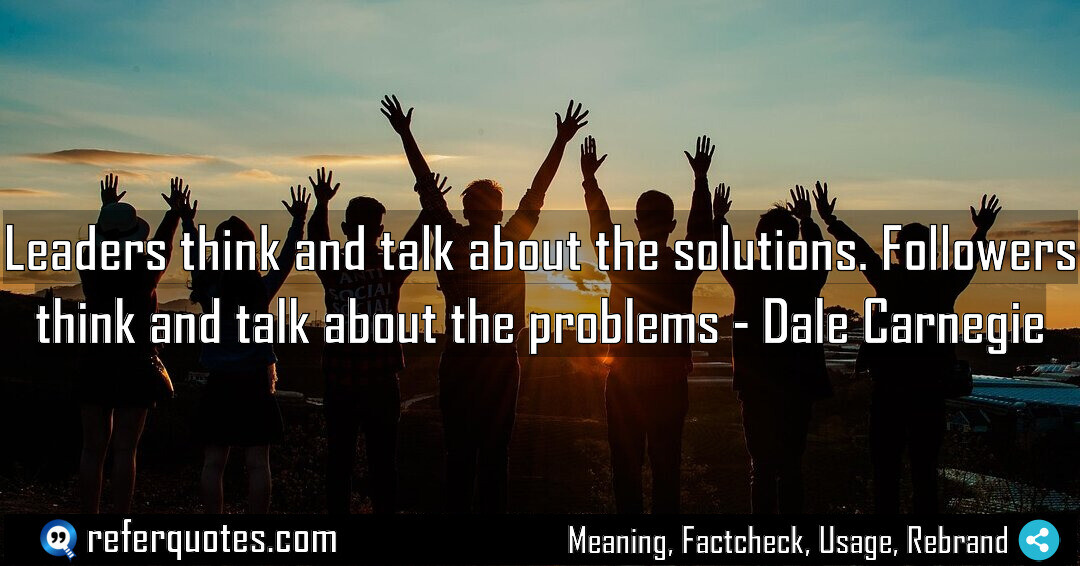Find audience, summary, explanation and origin of quote-Leaders think and talk about the solutions. Followers think and talk about the problems.
It’s a simple but powerful mindset shift that separates those who drive change from those who just observe it.
Share Image Quote:Table of Contents
Meaning
This quote is about focus. It’s about where you choose to direct your mental and conversational energy, toward the obstacle itself, or toward the path over, around, or through it.
Explanation
Let me break this down from my own experience. It’s not that leaders are blind to problems. Of course they see them. But their instinct, their default mode, is to immediately pivot to “Okay, so how do we fix this?” They occupy the mental space of possibility. Followers, and I’ve been guilty of this myself, can get stuck in the loop of dissecting the problem, complaining about it, marveling at how big it is. It’s a energy drain. The solution-focused approach is generative. It builds momentum. It’s the difference between being a thermostat that sets the temperature and a thermometer that just reads it.
Summary
| Category | Skill (66) |
|---|---|
| Topics | attitude (11), mindset (33), problem solving (3) |
| Style | assertive (14), concise (39), memorable (37) |
| Mood | motivating (20) |
Origin & Factcheck
| Author | Dale Carnegie (135) |
|---|---|
| Book | The Leader In You (61) |
About the Author
Dale Carnegie, an American writer received worldwide recognition for his influential books on relationship, leadership, and public speaking. Among his timeless classics, the Dale Carnegie book list includes How to Win Friends and Influence People is the most influential which inspires millions even today.
Official Website
Quotation Source:
| Leaders think and talk about the solutions. Followers think and talk about the problems |
| Publication Year/Date: 1993 (first edition) ISBN/Unique Identifier: 9781501181962 (Gallery Books 2017 reprint); also 9780671798093 (early Pocket Books hardcover) Last edition. Number of pages: Common reprints ~256 pages (varies by printing). |
| Chapter: The Mindset of Leadership, Approximate page from 1993 edition |
Context
In the book, this idea isn’t presented in a vacuum. It’s woven into a larger discussion about personal responsibility and influence. The context is about stepping into a leadership role in your own life, your career, your team, regardless of your official title. It’s about the language that builds that identity.
Usage Examples
- In a Team Meeting: When someone says “Our project timeline is impossible,” a leader reframes: “What specific parts of the timeline are the tightest, and what resources would we need to hit them?” See the shift? You’re not ignoring the problem, you’re attacking it with a solution-oriented question.
- For a Manager Coaching an Employee: If a direct report comes to you with a list of issues, your first response can be: “I hear the challenges. Let’s brainstorm three potential ways we could start to address the biggest one.” You’re training them to make the same mental pivot.
- For Yourself: This is the big one. Catch yourself when you’re complaining. Just notice it. Then ask yourself one powerful question: “What’s one small thing I can do right now to make this better?” That single question changes everything.
To whom it appeals?
| Audience | entrepreneurs (149), leaders (224), managers (117), students (335), teachers (152) |
|---|---|
This quote can be used in following contexts: career coaching,leadership programs,motivational seminars,entrepreneurship training,team development
FAQ
Question: Does this mean leaders should just ignore problems and be overly positive?
Answer: No. That’s a common misunderstanding. It’s not about ignoring the problem, it’s about not dwelling there. Acknowledge the problem, diagnose it quickly, and then pivot your energy to the solution. It’s the difference between a doctor who just describes your symptoms and one who prescribes a treatment.
Question: What if I’m not in a formal leadership position? Does this still apply?
Answer: It applies especially then. This is about influence, not authority. When you’re the person in a meeting who consistently moves the conversation toward solutions, people start to see you as a leader. You build a reputation as a problem-solver, and that’s how careers are made.
Question: How can I actually develop this habit? It sounds easier said than done.
Answer: Start small. It’s a muscle. For one week, make a pact with yourself that whenever you state a problem to a colleague, you will also suggest one possible next step or idea. Just one. It forces the mental shift. It feels awkward at first, but soon it becomes your new default.

